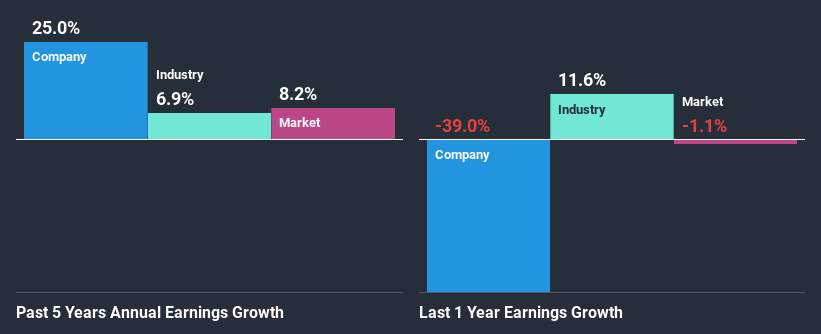- New Zealand
- /
- Food
- /
- NZSE:ALF
Will Weakness in Allied Farmers Limited's (NZSE:ALF) Stock Prove Temporary Given Strong Fundamentals?

With its stock down 14% over the past month, it is easy to disregard Allied Farmers (NZSE:ALF). But if you pay close attention, you might gather that its strong financials could mean that the stock could potentially see an increase in value in the long-term, given how markets usually reward companies with good financial health. Specifically, we decided to study Allied Farmers' ROE in this article.
Return on Equity or ROE is a test of how effectively a company is growing its value and managing investors’ money. In other words, it is a profitability ratio which measures the rate of return on the capital provided by the company's shareholders.
Check out our latest analysis for Allied Farmers
How Do You Calculate Return On Equity?
The formula for return on equity is:
Return on Equity = Net Profit (from continuing operations) ÷ Shareholders' Equity
So, based on the above formula, the ROE for Allied Farmers is:
19% = NZ$1.2m ÷ NZ$6.4m (Based on the trailing twelve months to June 2020).
The 'return' is the amount earned after tax over the last twelve months. That means that for every NZ$1 worth of shareholders' equity, the company generated NZ$0.19 in profit.
Why Is ROE Important For Earnings Growth?
Thus far, we have learned that ROE measures how efficiently a company is generating its profits. We now need to evaluate how much profit the company reinvests or "retains" for future growth which then gives us an idea about the growth potential of the company. Assuming everything else remains unchanged, the higher the ROE and profit retention, the higher the growth rate of a company compared to companies that don't necessarily bear these characteristics.
A Side By Side comparison of Allied Farmers' Earnings Growth And 19% ROE
To begin with, Allied Farmers seems to have a respectable ROE. Further, the company's ROE compares quite favorably to the industry average of 7.7%. This certainly adds some context to Allied Farmers' exceptional 25% net income growth seen over the past five years. We reckon that there could also be other factors at play here. For instance, the company has a low payout ratio or is being managed efficiently.
We then compared Allied Farmers' net income growth with the industry and we're pleased to see that the company's growth figure is higher when compared with the industry which has a growth rate of 6.9% in the same period.

Earnings growth is an important metric to consider when valuing a stock. It’s important for an investor to know whether the market has priced in the company's expected earnings growth (or decline). This then helps them determine if the stock is placed for a bright or bleak future. If you're wondering about Allied Farmers''s valuation, check out this gauge of its price-to-earnings ratio, as compared to its industry.
Is Allied Farmers Using Its Retained Earnings Effectively?
Allied Farmers has a really low three-year median payout ratio of 23%, meaning that it has the remaining 77% left over to reinvest into its business. So it looks like Allied Farmers is reinvesting profits heavily to grow its business, which shows in its earnings growth.
Moreover, Allied Farmers is determined to keep sharing its profits with shareholders which we infer from its long history of three years of paying a dividend.
Summary
Overall, we are quite pleased with Allied Farmers' performance. In particular, it's great to see that the company is investing heavily into its business and along with a high rate of return, that has resulted in a sizeable growth in its earnings. If the company continues to grow its earnings the way it has, that could have a positive impact on its share price given how earnings per share influence long-term share prices. Not to forget, share price outcomes are also dependent on the potential risks a company may face. So it is important for investors to be aware of the risks involved in the business. Our risks dashboard would have the 6 risks we have identified for Allied Farmers.
If you decide to trade Allied Farmers, use the lowest-cost* platform that is rated #1 Overall by Barron’s, Interactive Brokers. Trade stocks, options, futures, forex, bonds and funds on 135 markets, all from a single integrated account. Promoted
New: Manage All Your Stock Portfolios in One Place
We've created the ultimate portfolio companion for stock investors, and it's free.
• Connect an unlimited number of Portfolios and see your total in one currency
• Be alerted to new Warning Signs or Risks via email or mobile
• Track the Fair Value of your stocks
This article by Simply Wall St is general in nature. It does not constitute a recommendation to buy or sell any stock, and does not take account of your objectives, or your financial situation. We aim to bring you long-term focused analysis driven by fundamental data. Note that our analysis may not factor in the latest price-sensitive company announcements or qualitative material. Simply Wall St has no position in any stocks mentioned.
*Interactive Brokers Rated Lowest Cost Broker by StockBrokers.com Annual Online Review 2020
Have feedback on this article? Concerned about the content? Get in touch with us directly. Alternatively, email editorial-team (at) simplywallst.com.
About NZSE:ALF
Flawless balance sheet with solid track record.
Market Insights
Community Narratives




